Advertisement
The Rise of Decentralized Finance (DeFi): Revolutionizing the Future of Banking and Finance
By tgreen
3 min read
Advertisement - Continue reading below
Decentralized Finance (DeFi) is a rapidly growing sector within the financial industry that leverages blockchain technology to create decentralized and permissionless financial services. In recent years, DeFi has gained significant traction, offering innovative solutions for banking, lending, trading, and asset management. This article explores the rise of DeFi, its potential to disrupt traditional finance, and the opportunities and challenges it presents for investors and consumers alike.
Understanding Decentralized Finance: Decentralized Finance, or DeFi, refers to a broad category of financial services and applications built on blockchain networks, such as Ethereum. Unlike traditional finance, which relies on centralized intermediaries like banks and financial institutions, DeFi operates on decentralized platforms governed by smart contracts. These smart contracts automate and enforce the terms of financial agreements, eliminating the need for intermediaries and providing users with greater control over their assets and transactions.
Key Features of DeFi: DeFi encompasses a wide range of financial services and products, including decentralized exchanges (DEXs), lending protocols, yield farming platforms, and asset management tools. Some of the key features of DeFi include:
- Permissionless Access: Anyone with an internet connection and a cryptocurrency wallet can access DeFi services, without the need for traditional banking accounts or credit checks.
- Transparency: DeFi transactions are recorded on public blockchains, providing full transparency and auditability of financial activities.
- Security: DeFi protocols are built on secure and tamper-resistant blockchain networks, reducing the risk of fraud, censorship, and hacking.
- Interoperability: DeFi platforms are often interoperable, allowing users to seamlessly transfer assets and data between different protocols and applications.
- Programmability: Smart contracts enable programmable automation of financial agreements, enabling the creation of complex financial instruments and decentralized applications (dApps).
Potential Benefits of DeFi: The rise of DeFi has the potential to democratize access to financial services, empower individuals to take control of their finances, and reduce reliance on traditional banking systems. Some of the potential benefits of DeFi include:
- Financial Inclusion: DeFi opens up access to financial services for underserved populations, including the unbanked and underbanked, who may not have access to traditional banking services.
- Lower Costs: DeFi platforms typically have lower fees compared to traditional financial institutions, making financial services more affordable and accessible to a broader range of users.
- Global Accessibility: DeFi operates on a borderless and decentralized infrastructure, allowing users to access financial services from anywhere in the world without geographical restrictions.
- Innovation: DeFi fosters innovation and experimentation in financial services, enabling the development of new products and solutions that were not possible in the traditional finance ecosystem.
Challenges and Risks: Despite its potential, DeFi also faces several challenges and risks that must be addressed for the sector to realize its full potential:
- Security Vulnerabilities: DeFi platforms are susceptible to smart contract bugs, vulnerabilities, and exploits, which can result in the loss of user funds.
- Regulatory Uncertainty: The regulatory landscape for DeFi is still evolving, with regulators grappling with how to classify and regulate decentralized financial services.
- Scalability and Usability: DeFi platforms currently face scalability and usability challenges, including slow transaction speeds, high gas fees, and complex user interfaces that may deter mainstream adoption.
- Market Volatility: DeFi markets are highly volatile and prone to price fluctuations, presenting risks for investors and users.
Conclusion: Decentralized Finance (DeFi) has the potential to revolutionize the future of banking and finance by democratizing access to financial services, fostering innovation, and empowering individuals to take control of their finances. While DeFi presents exciting opportunities for investors and consumers, it also poses challenges and risks that must be addressed for the sector to mature and thrive. As the DeFi ecosystem continues to evolve, it will be essential for stakeholders, including regulators, developers, and users, to collaborate and navigate these challenges to unlock the full potential of decentralized finance.
Advertisement - Continue reading below










